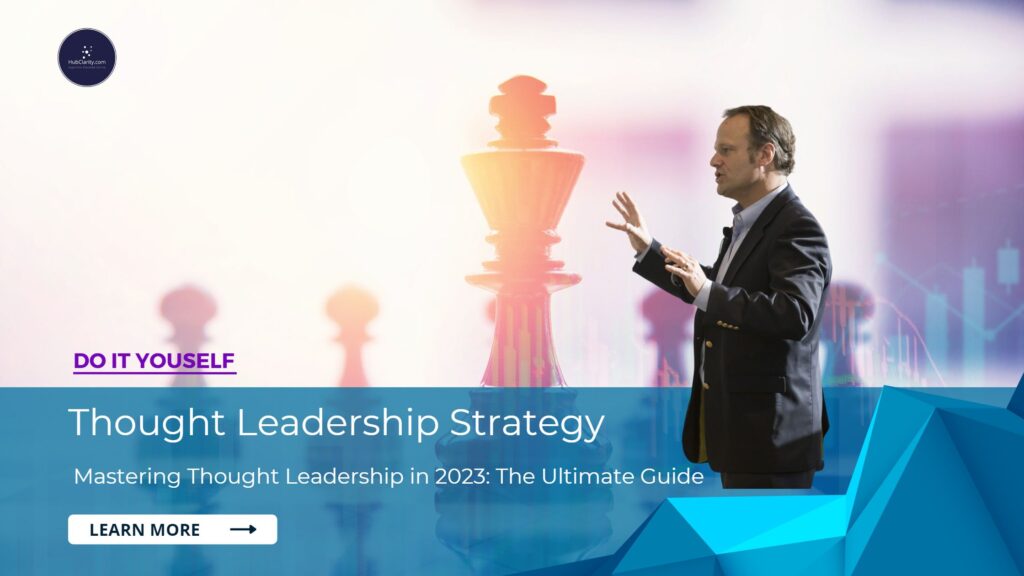5 Types of Thought Leadership: A Guide to Establishing Expertise and Influence in Your Field
Thought leadership – a term that embodies expertise, innovation, and influence in a specific field – is a powerful tool for individuals and organizations seeking to shape the discourse in their industry. With various types of thought leadership, each offering a unique focus and approach, let’s explore five distinctive pathways to becoming a thought leader: Organizational, Product, Industry, Field of Study, and Visionary. This in-depth guide will provide insights into the characteristics, strategies, and examples of each type, helping you navigate the journey to becoming a thought leader in your niche.
Organizational Thought Leader
The first types of thought leaders we’ll discuss is organizational thought leadership occurs on both corporate and individual levels. Corporately, it involves companies that demonstrate innovation and a commitment to making a positive impact in their industry.
One approach for organizations to establish thought leadership is to focus on corporate social responsibility (CSR) initiatives. By incorporating sustainability, ethical practices, and social consciousness into their operations, organizations can attract like-minded customers, employees, and stakeholders. For example, Patagoniav, an outdoor clothing and gear retailer, is known for its environmental sustainability initiatives, donating 1% of sales to environmental causes and using sustainable materials in its products.
On an individual level, Organizational Thought Leaders are usually senior-level employees who set strategic goals, inspire, and motivate others within their organization. These leaders create a work culture that fosters innovation, collaboration, and positive change. For instance, Carlos Ghosn, former CEO of Nissan, played a significant role in the company’s turnaround by setting ambitious goals, streamlining operations, and promoting a culture of innovation.
Product Thought Leader
Product Thought Leaders excel in creating innovative products and services, delivering high-quality solutions for customers. To become a Product Thought Leader, it is essential to have a deep understanding of customer needs, invest in research and development. It is also important to possess an unwavering commitment to quality and innovation.
Tesla, for example, revolutionized electric vehicles by addressing the most significant pain points for customers, such as battery life and charging speeds. Tesla was able to make electric cars more practical and appealing for everyday use.
To establish thought leadership in this area, companies can:
- Invest in research and development to create cutting-edge products
- Regularly update and improve their offerings based on customer feedback
- Share their knowledge and expertise through blogs, webinars, and conferences
Industry Thought Leader
Focusing on a specific industry, Industry Thought Leaders possess a deep understanding of their field and drive change. These leaders are often at the forefront of industry trends, consistently sharing valuable insights, and shaping the discourse within their niche.
Jeff Bezos, Amazon’s founder, is a prime example of an Industry Thought Leader. He revolutionized the retail industry with his innovative e-commerce approach, creating new ways for consumers to shop and for businesses to reach customers.
To become an Industry Thought Leader:
- Stay current with industry trends and news
- Share valuable insights and expertise through various channels, such as blog posts, podcasts, or social media
- Speak at industry conferences and events
Field of Study Thought Leader
Field of Study Thought Leaders concentrate on specific areas of research, shaping the discourse and driving innovation in their fields. They possess expertise in a particular subject matter and are often sought after for their insights and knowledge.
Seth Godin, who redefined marketing by focusing on storytelling and human connection, and Dr. Jane Goodall, renowned primatologist and anthropologist, are prime examples of Field of Study Thought Leaders.
To establish thought leadership in a field of study:
- Pursue advanced degrees or certifications to gain expertise in a specific subject
- Publish research or articles in reputable journals
- lecture at universities or industry events
Visionary Thought Leader
Visionary Thought Leaders articulate a compelling vision for the future, inspiring others to join their journey. They see the bigger picture and are committed to making a positive impact on the world.
Elon Musk, founder of Tesla and SpaceX, exemplifies this type of thought leader. He envisions a sustainable future through electric vehicles and renewable energy sources and dreams of colonizing Mars to ensure the survival of the human race.
To become a Visionary Thought Leader:
- Develop a clear and compelling vision for the future
- Communicate your vision effectively through various channels, including speeches, articles, and social media
- Engage with like-minded individuals and organizations to build a community around your vision
In Conclusion:
Thought leadership can be a valuable tool for individuals and organizations looking to establish themselves as experts in their field and make a positive impact. Understand the 5 types of thought leaders: Organizational, Product, Industry, Field of Study, and Visionary. This can help you gain a deeper understanding of what it takes to become a thought leader.
To embark on your journey toward thought leadership:
Identify the type of thought leadership that resonates with your skills, interests, and goals
Cultivate expertise, credibility, and a unique perspective in your chosen area
Share your knowledge and insights through various channels, such as writing, speaking, and teaching
Network with other thought leaders and engage with your target audience
As you develop your thought leadership skills and presence, you’ll find yourself becoming an influential voice in your industry, creating new opportunities for personal and professional growth. By committing to a path of continuous learning, innovation, and influence, you can leave a lasting impact on your field and the world.
|
Thought Leader Type |
Description |
Examples |
Strategies to Establish Thought Leadership |
|
Organizational |
Companies and individuals demonstrating innovation and commitment to their industry |
Patagonia, Carlos Ghosn |
Focus on CSR initiatives, create a culture of innovation |
|
Product |
Experts in creating innovative products and services that address customer needs |
Tesla |
Invest in R&D, update offerings, share knowledge |
|
Industry |
Possess deep understanding of their field and drive change within their industry niche |
Jeff Bezos |
Stay current with trends, share insights, speak at events |
|
Field of Study |
Concentrate on specific areas of research, shaping discourse and driving innovation in their fields |
Seth Godin, Dr. Jane Goodall |
Gain expertise, publish research, lecture at events |
|
Visionary |
Articulate a compelling vision for the future, inspiring others to join their journey |
Elon Musk |
Develop a clear vision, communicate effectively, build a community |


